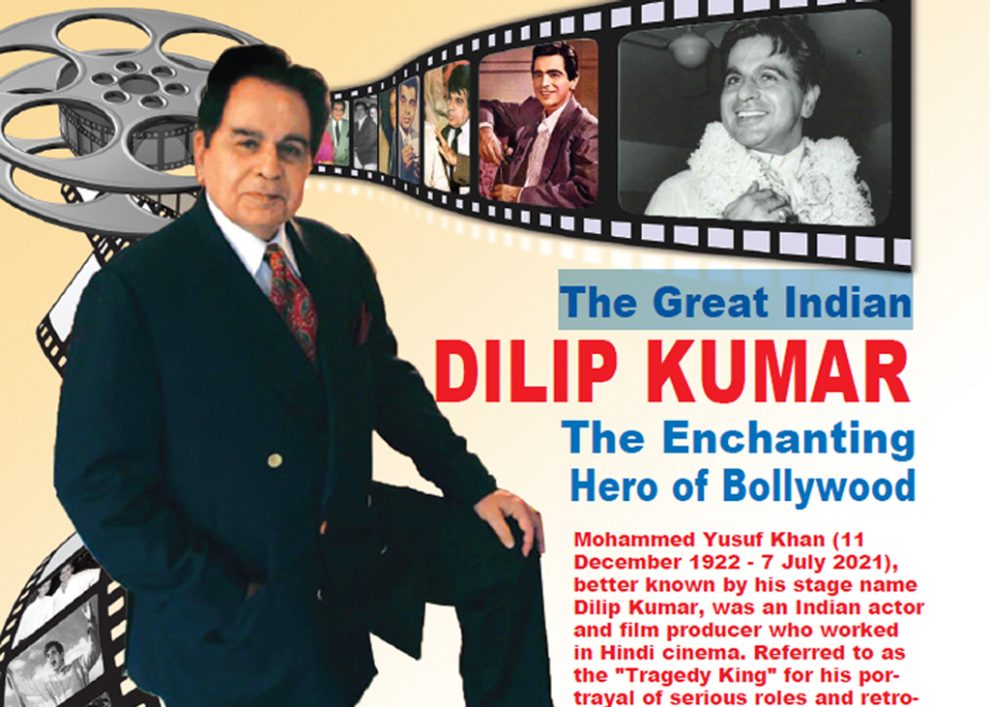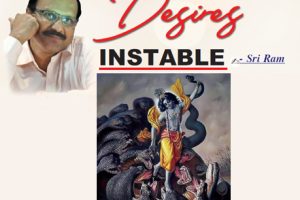The Enchanting Hero of Bollywood
Mohammed Yusuf Khan (11 December 1922 – 7 July 2021), better known by his stage name Dilip Kumar, was an Indian actor and film producer who worked in Hindi cinema. Referred to as the “Tragedy King” for his portrayal of serious roles and
retrospectively as “The First Khan” of Bollywood, he has been described as one of the most successful film stars in the industry and is credited with bringing a distinct form of method acting to cinema. Kumar holds the record for most wins
for the Filmfare Award for Best Actor (eight, which was later equalled by Shah Rukh Khan), and was also the inaugural recipient of the award.
In a career spanning over five decades, Kumar worked in over 65 films in a variety of roles. He debuted as an actor in the film Jwar Bhata (1944), produced by Bombay Talkies. Following a series of unsuccessful ventures, he had his first box
office hit in Jugnu (1947). Kumar found further success with the romantic Andaz (1949), the swashbuckling Aan (1952), the social drama Daag (1952), the dramatic Devdas (1955), the comical Azaad (1955), the romantic social Naya Daur (1957),
the noir mystery Madhumati (1958), the comedydrama Paigham (1959) the epic historical Mughal-e-Azam (1960), the social dacoit crime drama Gunga Jamuna (1961), and the comedy Ram Aur Shyam (1967). Both Andaz and Aan briefly became the
highestgrossing Indian film up to that point, a feat later achieved by Mughal-e- Azam, which sustained the record for 15 years. As of 2021, the latter remains the highest-grossing film in India when adjusted for inflation. The 1970s saw
Kumar’s career take a downturn, marked by three back to back commercial failures, namely Dastaan (1972), Sagina (1974) and Bairaag (1976). In 1976, he went on a five-year hiatus from film performances and returned with the revolutionary
drama Kranti, which was the highest-grossing Indian film of the year. He continued to play leading roles in films such as Shakti (1982), Karma (1986), and Saudagar (1991). His last on-screen appearance was in the commercially unsuccessful
Qila (1998), which saw him in a dual role. Kumar later served as a member of the Rajya Sabha, the upper house of India’s parliament, from 2000 to 2006. Kumar’s personal life was the subject of much media attention. He was in a long-term
relationship with actress and frequent co-star Madhubala that ended after the Naya Daur court case in 1957. He married actress Saira Banu in 1966 and resided in Bandra, a suburb of Mumbai, until his death in 2021. For his contributions to
film, the Government of India awarded him with the Padma Bhushan in 1991 and the Padma Vibhushan in 2015, the country’s third and second- highest civilian awards respectively. He was also awarded India’s highest accolade in the field of
cinema, the Dadasaheb Phalke Award in 1994. In 1998, the Government of Pakistan conferred Kumar with Nishan-e- Imtiaz, their highest civilian decoration, making him the only Indian to have received the honour. The house that Kumar grew up
in, located in Peshawar, was declared a national heritage monument in 2014 by the Pakistani government.
Early life
Kumar was born as Mohammad Yusuf Khan on 11 December 1922, into an Awan family at his family home in the Qissa Khawani Bazaar area of Peshawar, a city in North-West Frontier Province, British India (present-day Khyber Pakhtunkhwa,
Pakistan). He was one of the twelve children of Lala Ghulam Sarwar Khan and his wife Ayesha Begum. His father was a fruit merchant. Khan was schooled at Barnes School, Deolali, where his father owned orchards. He grew up in the same
neighbourhood as Raj Kapoor, his childhood friend, and later his colleague in the film industry. In 1940, he moved to Pune and set up a dry fruit supply shop and a canteen. Despite hailing from Peshawar, Khan’s family decided to remain in
Bombay following the partition of the subcontinent in 1947. Khan never acted under his birth name, debuting in Jwar Bhata in 1944 under the stage name Dilip Kumar. In his autobiography, Dilip Kumar: The Substance and the Shadow, he wrote
that the name was a suggestion from Devika Rani, who was one of the producers on Jwar Bhata. In an interview in 1970, he said that he adopted this name out of fear of his father, who never approved of his acting career.
Career
1940s: First film roles and initial success
Kumar’s first film was Jwar Bhata in 1944, which went unnoticed. After a few more unsuccessful films, it was Jugnu (1947), in which he starred alongside Noor Jehan, that became his first major hit at the box office. His next major hits were
the 1948 films Shaheed and Mela. He got his breakthrough role in 1949 with Mehboob Khan’s Andaz, in which he starred alongside Raj Kapoor and Nargis. At the time of its release, Andaz was the highest-grossing Indian film ever, until its
record was broken by Kapoor’s Barsaat that same year. Shabnam was another box office hit that was also released in 1949.

















Add Comment